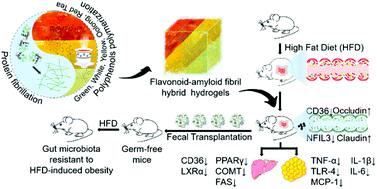Flavonoid–amyloid fibril hybrid hydrogels for obesity control via the construction of gut microbiota†
Abstract
Innovative precise clinical approaches to protect humans from the alarming global growth of chronic disease epidemics, such as metabolic syndrome (MetS), are urgently needed. Here, we introduce protein hydrogels developed through the self-assembly of flavonoids and protein amyloid fibrils as a possible approach to mitigate obesity. After oral administration of the hydrogels, high-fat diet (HFD)-induced obesity was significantly prevented in mice, accompanied by downregulation of lipogenesis and pro-inflammatory genes in the liver and adipose tissue and upregulation of lipid metabolism genes. Additionally, gut microbiota dysbiosis caused by HFD-induced obesity was markedly ameliorated. Overexpression of the host intestinal lipid absorption genes CD36 and NFIL3 decreased significantly, while the inhibited expression of the gene encoding the tight junction protein Claudin-1 was reversed. Furthermore, transplantation of the gut microbiota educated by the hydrogels to germ-free mice showed a substantial prevention effect on HFD-induced obesity, accompanied by a distinct microbiota structure that resisted HFD-induced divergence in microbiota structure. The flavonoid–amyloid fibril hydrogels inhibited the core molecular links between gut microbes and host intestinal lipid absorption, enhanced intestinal barrier function and reduced the abundance of bacterial taxa generating pro-inflammatory products, providing a general concept to design edible biomaterials for obesity prevention by targeting host–microbiota crosstalk.



 Please wait while we load your content...
Please wait while we load your content...